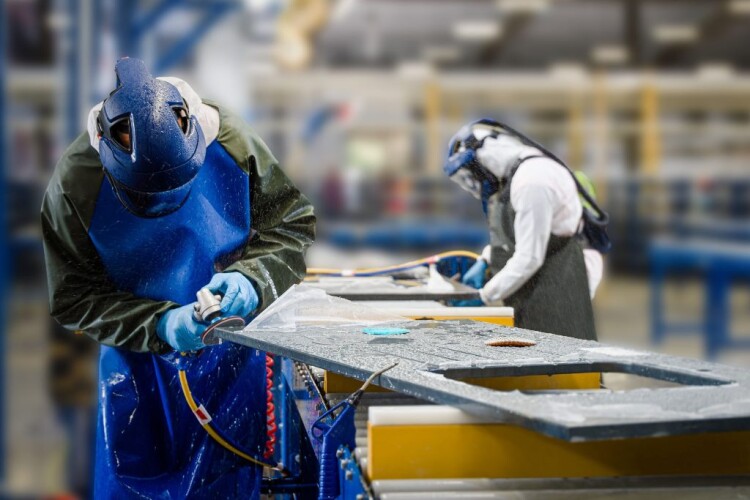The British Occupational Hygiene Society (BOHS), a scientific charity that promotes health in the workplace, says that the risk of silicosis from working with quartz and other engineered stones can be managed out.
As we have previously reported, Australia is banning engineered stone, a popular material for bathrooms and kitchen worktops, because of the health risks associated with the respirable crystalline silica (silica dust) that is generated when workers cut, shape or polish it. The risk is to workers involved in the processes, and not to homeowners.
The USA is also reported to be taking emergency regulatory action.
The BOHS says that, although the disease is almost impossible to treat effectively, it is easily preventable using standard controls, such as water suppression of dust. Therefore there is no need for the UK to consider banning it.
While engineered stone is largely imported, the finishing use of engineered stone, particularly for kitchens, has risen significantly in the UK. In 2020, it rose by 75% according to industry data. The UK is home to the largest engineered stone factory in Europe – in Scunthorpe – employing around 350 people.
According to the Health & Safety Executive (HSE), “silica is the biggest risk to construction workers after asbestos”.
Lord Younger, a junior minister in the Department for Work & Pensions told parliament in January that a UK ban was not being considered.
He said: “The HSE is not currently considering restricting the use of engineered stone. The Control of Substances Hazardous to Health Regulations already require employers to put in place measures to prevent workers being exposed to respirable crystalline silica. This includes adequate controls ensuring compliance with the workplace exposure limit and health surveillance identifying potential ill health. HSE keeps requirements for reporting occupational diseases under review and is not currently making silicosis reportable.”

Australia has reported 260 cases of silicosis while Britain has had none, that debate heard. The difference, it was argued, is that a lot of workers using engineered stone in Australia are known to be SMEs or sole traderes who are ‘hard to reach’, the minister said. In the UK, there are better controls.
Better, but maybe not yet good enough...
According to the BOHS, since that mid-January debate in the Houe of Lords, the Royal Brompton Hospital has identified at least three confirmed cases of silicosis in the UK. There is evidence that is more prevalent than reported because of widespread misdiagnosis, just like early asbestosis.
BOHS president Alex Wilson said: "Sadly, there is reasonable probability that there are more cases that have not been detected or reported. Accurate diagnosis of silicosis is difficult and it can easily be mistaken for a more common complaint, sarcoidosis, for example.
“It’s an old problem in a new and nasty guise. Like so many occupational diseases, it is really quite easy to prevent, but impossible to cure. It’s vital that anyone potentially being exposed in the engineered stone industry has access to appropriate medical surveillance, but more importantly, it’s vital that proper dust controls are used at all times. Anyone who isn’t sure if their controls are good enough needs to get expert advice from an occupational hygienist.”
BOHS chief executive Kevin Bampton added: "The society has provided feedback to the Health & Safety Executive on areas where current guidance provided by the regulator might be further strengthened to ensure that industry provides effective controls and maintains vigilance. It also supports the work of an All-Party Parliamentary Group which is considering effective legislative and policy means to protect workers. Calls for a ban are not going to save lives, but education, proper workplace controls and awareness of the risks will."
For one UK kitchen supplier, however, it is a case of better safe than sorry. Canterbury-based kitchen fitter Herringbone has decided to follow the Australian line rather than rely on ministerial advice and has unilaterally decided to stop selling quartz worktops altogether. [See previous report here.]
Got a story? Email news@theconstructionindex.co.uk
.png)


